Key takeaways:
- Data breaches can result from human error, weak passwords, and outdated software, highlighting the need for robust security practices.
- Privacy advocacy is vital for raising awareness about data protection and pushing for accountability from companies regarding user data.
- Effective personal data protection strategies include using strong and unique passwords, regular software updates, and being cautious with personal information shared online.
- Advocating for privacy can involve educating others, engaging on social media, and participating in local advocacy groups to influence policy changes.
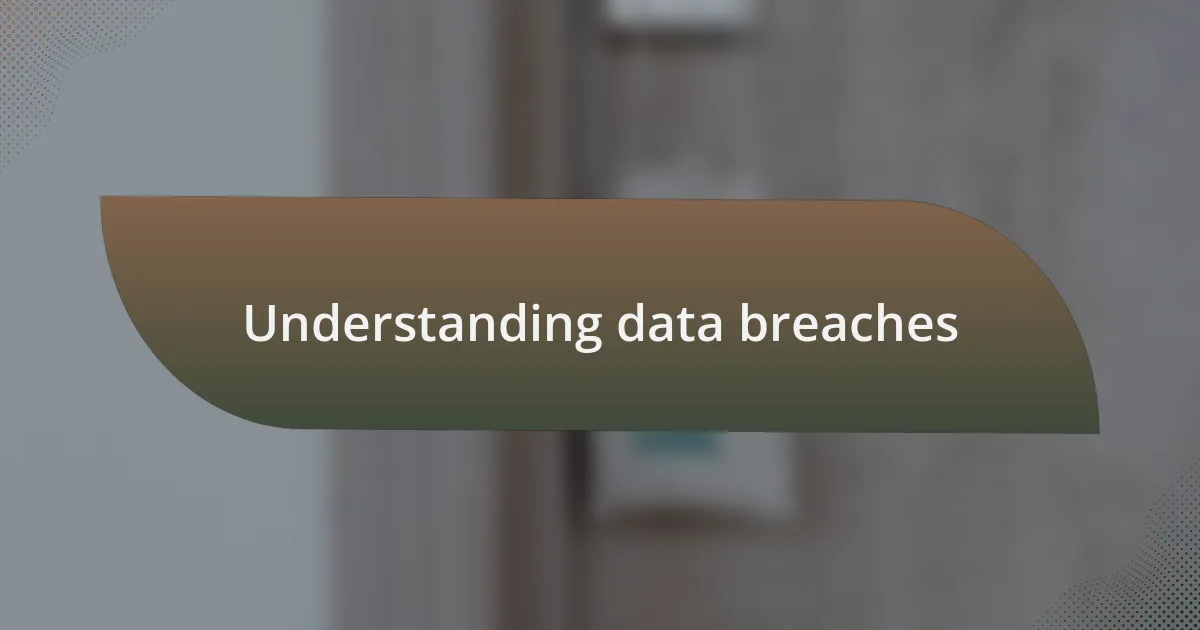
Understanding data breaches
Data breaches occur when unauthorized individuals access sensitive information, often leading to severe personal and financial consequences. I remember my own initial encounter with this threat; I was shocked to discover that my seemingly secure online account had been compromised. It made me realize just how vulnerable we all are in the digital age.
Understanding the mechanics of a data breach is essential. These incidents can happen due to various reasons, such as hacking, phishing attacks, or even employee negligence. I’ve seen firsthand how critical it is for organizations to invest in robust security measures, especially after friends of mine found themselves victims after a simple oversight on a poorly secured network.
Have you ever considered what happens to your information after a breach? The repercussions extend far beyond the initial exposure. When my friend had her data stolen, it affected her credit score and peace of mind for years. This common experience highlights the importance of safeguarding our personal data; we must proactively take steps to protect ourselves.
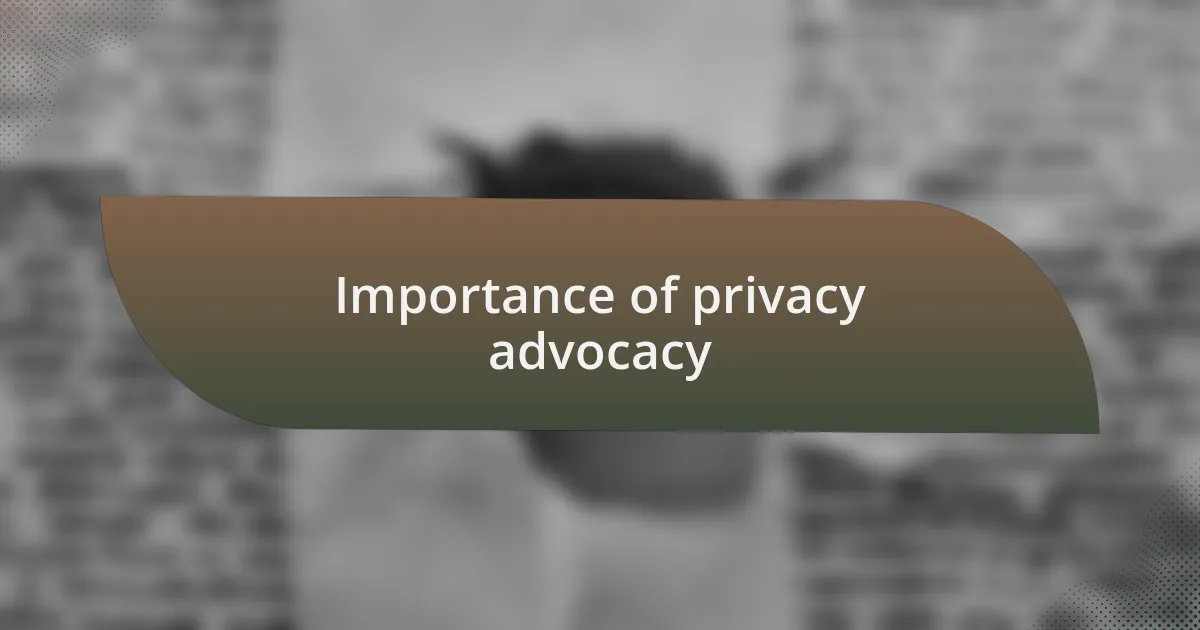
Importance of privacy advocacy
Privacy advocacy is crucial in today’s digital landscape where our personal information is routinely collected and potentially exploited. I recall attending a seminar about online privacy, where the speaker shared heart-wrenching stories of individuals who faced identity theft. It struck me deeply to realize that behind every statistic lies a real person affected by privacy violations.
Moreover, as someone who closely monitors privacy policies, I’ve seen how often companies downplay their responsibility to protect user data. This lack of accountability can lead to disastrous outcomes for consumers. Isn’t it frustrating that we often must fight for our rights to privacy? Effective advocacy raises awareness and empowers individuals to demand transparency from companies regarding their data practices.
Additionally, privacy advocacy plays a vital role in shaping policies that keep our data secure. I often think back to a conversation I had with a local activist who passionately fought for stronger data protection laws. Their determination inspired me to get more involved, underscoring how advocacy can lead to significant changes that protect all of us in an interconnected world.
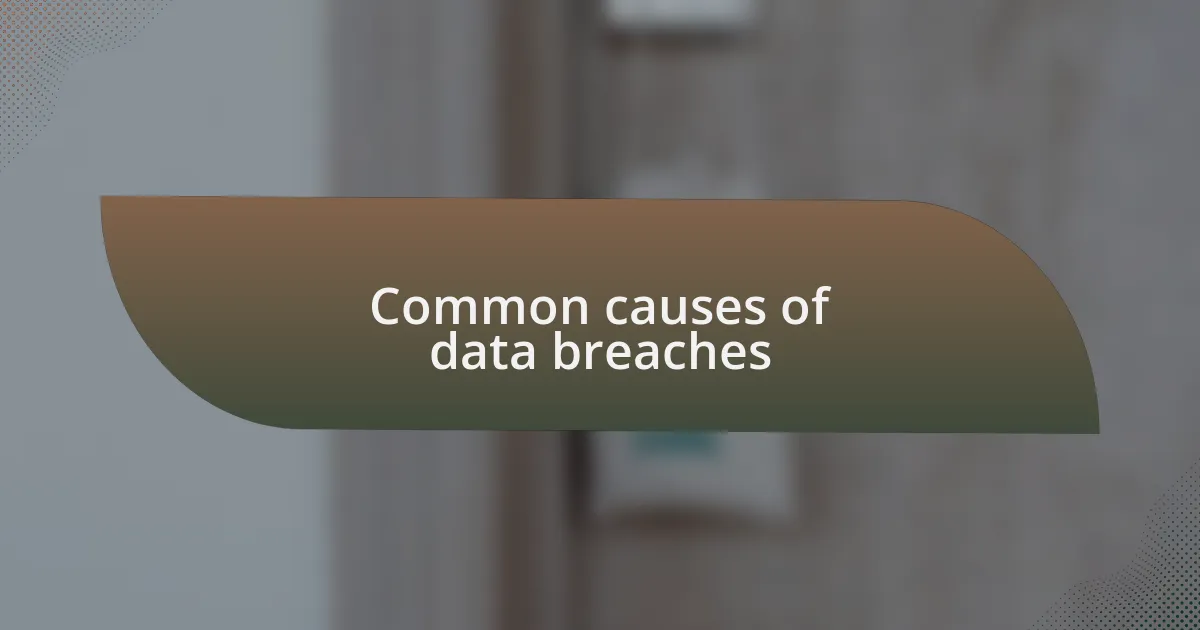
Common causes of data breaches
When it comes to understanding data breaches, one of the most common causes is human error. I remember a time when a colleague accidentally sent sensitive information to the wrong recipient. It served as a chilling reminder of how a simple mistake can lead to significant consequences. Have you ever wondered how often such oversights happen in larger organizations? They’re more frequent than we might like to admit.
Another significant cause of data breaches lies in weak or stolen credentials. I’ve seen plenty of situations where individuals reuse passwords across multiple sites, thinking they’re saving themselves the hassle. It’s shocking how easily hackers can exploit this behavior. In my experience, employing unique passwords and using password managers can drastically reduce the risk, yet many still choose convenience over security.
Finally, outdated software presents an alarming vulnerability for both individuals and businesses alike. I once encountered a small business that neglected to update its antivirus software, resulting in a devastating malware attack. This incident made me realize just how critical regular updates are in today’s constantly evolving threat landscape. Doesn’t it make you think about how often we overlook something so simple yet vital?
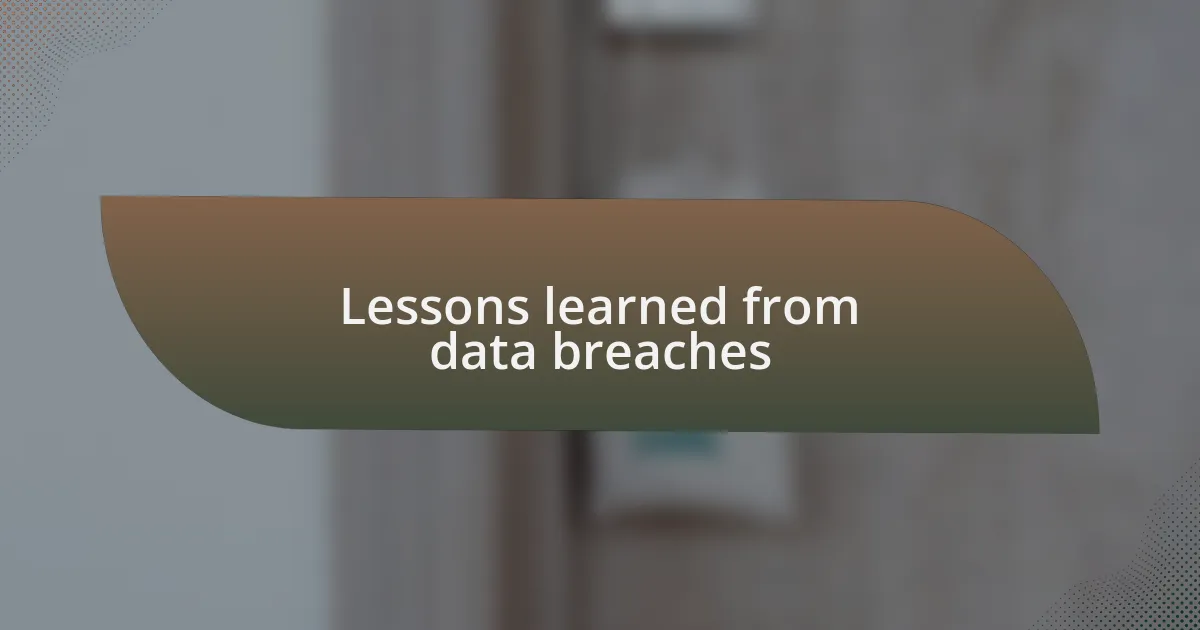
Lessons learned from data breaches
One key lesson I’ve learned from observing data breaches is the importance of a strong organizational culture around security. I once worked at a firm where monthly security training sessions felt tedious at the time, but they ultimately revolutionized how my colleagues viewed data protection. Have you ever realized that fostering accountability and awareness can cultivate a security-first mindset? It makes all the difference.
Another significant takeaway for me has been the need for a robust incident response plan. In a previous role, we faced a small data breach, and our team was caught flat-footed. I vividly remember the anxiety as we scrambled to contain the situation. That experience taught me that preparing for the worst is crucial; having a clear plan can mitigate damage and restore trust more effectively than addressing the fallout reactively.
Lastly, I’ve come to appreciate the value of transparency when a breach does occur. I recall a company that quickly communicated a recent breach to its users, explaining the steps being taken to resolve it. This open approach not only helped rebuild trust but also engaged customers in a way that felt genuine. Isn’t it refreshing to see companies take responsibility rather than hiding behind corporate jargon? It’s a fundamental lesson that resonates deeply in the realm of privacy advocacy.
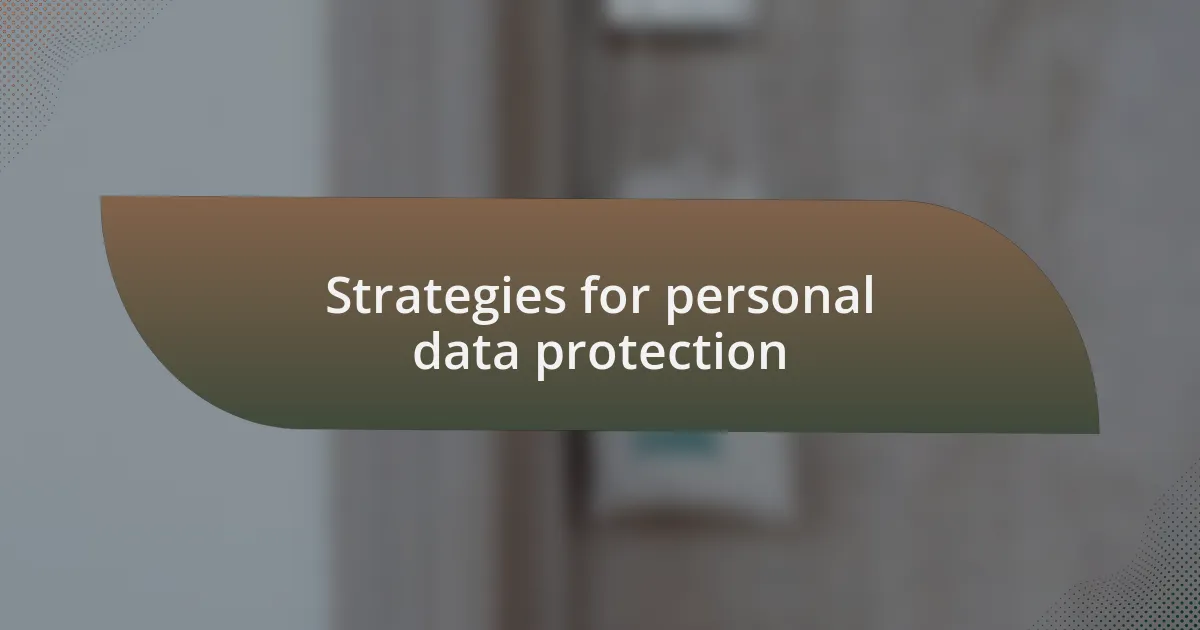
Strategies for personal data protection
To protect personal data effectively, one must prioritize strong and unique passwords. I recall a time when I used the same password across numerous sites, only to find myself at the mercy of a breach on one of them. The wave of panic that washed over me made it clear: a password manager became my best friend, generating and storing complex passwords. Have you considered how vulnerable your online presence might be with weak or repeated passwords?
Another essential strategy revolves around regular software updates. I learned this the hard way during a routine check of my devices when I discovered an unpatched vulnerability. That delayed update left my system exposed for weeks. Now, I ensure that all my applications and systems are updated immediately, safeguarding my data from lurking threats. Have you thought about the risks of ignoring those pesky notifications?
Lastly, I cannot stress enough the importance of being cautious with personal information shared online. I once posted a seemingly harmless detail on social media, only to realize later that it could be pieced together to formulate security questions for my accounts. It was an eye-opening moment that prompted me to rethink every interaction online. Are you aware of how much detail you divulge unintentionally? Being mindful of what you share can be a game-changer for your personal data security.
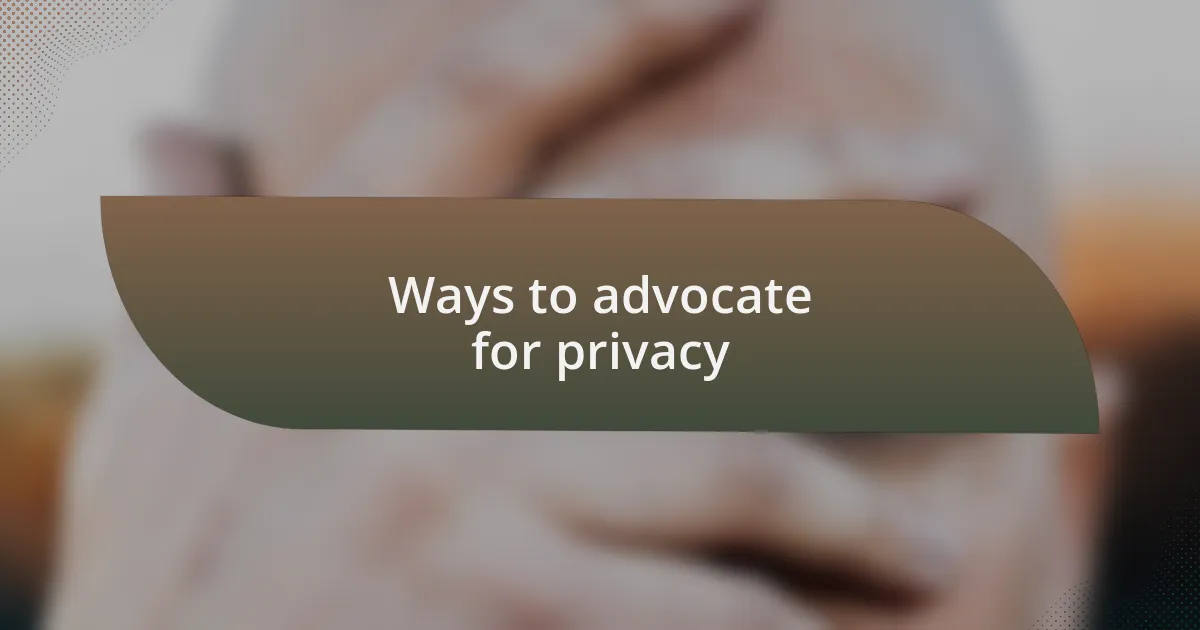
Ways to advocate for privacy
One effective way to advocate for privacy is to educate those around you about data protection. I remember a casual conversation with a friend who was blissfully unaware of the risks of free public Wi-Fi. As I shared my own story of a close call with a potential data leak, I saw the realization in their eyes. Have you taken the time to share your knowledge with friends and family? It’s surprising how much impact a simple discussion can have – it can empower others to take their own privacy seriously.
Another approach involves being active on social media platforms to raise awareness. I often post articles and tips about privacy that resonate with my experiences. A few weeks ago, I shared a graphic explaining the importance of two-factor authentication, and to my surprise, it sparked a lively discussion among my followers. How often do we miss opportunities to inform even just a handful of people? Every share, like, or comment has the potential to ripple out, creating a more informed community.
Participating in local advocacy groups is another powerful way to push for stronger privacy protections. I joined a local organization that focuses on digital rights, and it has been eye-opening. Engaging with like-minded individuals has not only broadened my perspective on privacy issues, but it has also provided a platform to voice our concerns effectively. Have you considered the strength in numbers when it comes to advocating for privacy? Collaborating with others fuels passion and can lead to real change.